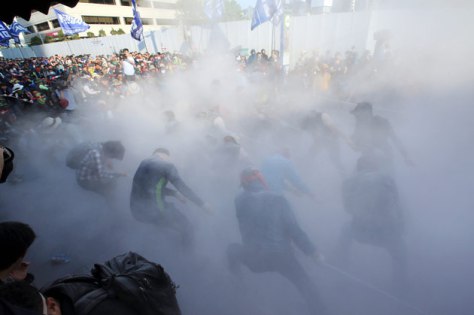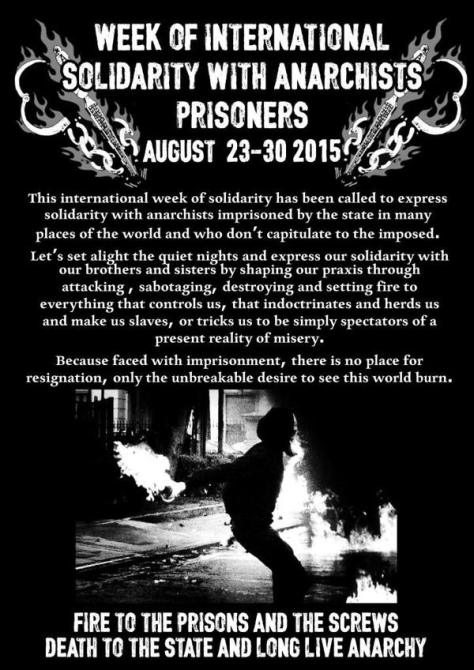Starting in spring, the anarchist appeal To Change Everything was adapted into Korean and distributed in paper and online in South Korea. Many welcomed it; the first printing ran out quickly.
It also provoked a strong reaction when the country’s major corporate news agency reported on it and on a project appearing on the appeal’s blog to gather and distribute songs against the National Security Law. The journalist even went to the prosecutor’s office, inquiring whether these activities constituted “aid to the enemy” (in other words, treason), which is what the National Security Law targets. The official’s response was that the answer “depends on an eventual analysis of whether this is part of an intention to threaten the national order.” In the corporate media, the numerous comments posted online with the article expressed a unanimous condemnation of these “pro-North Koreans” that we supposedly are (ignoring the “anarchist” reference), demanding even severer laws and repression. For example, “These pro-North Koreans should be sent to the good old ‘re-education camp’ to be reminded the fact that this country is still at war.”

This stir in the corporate media and the right-wing movement it fuels coincided with another one: a little witch-hunt following the arrest, investigation, and prosecution of someone on charges of having burned a Korean flag. On April 18, as a movement in response to the authorities’ cover-up of a ferry disaster last year converged in downtown Seoul, an exasperated youngster, provoked by journalists, picked up a paper national flag left on the ground and lit it on fire, making headlines in corporate media. Based on “CCTV and other evidence,” the police arrested him in the following days in another city. Using a warrant for search and seizure to discover his “affiliations,” the police raided his housing collective—which happens to be a center for diverse autonomous social movements including some recent anarchist activities, though the arrestee is not connected to them.
Though this kind of police repression combined with corporate and right-wing fervor is nothing new in this state of suspended civil war, this is a sign of what many feel to be a worsening political climate. Some Korean anarchists feel that we are isolated in a tightly controlled island, a prison. Nevertheless, by all means necessary, we must show that we are not so isolated.
A Call to Action
This wave of quasi-fascist nationalism provides an opportunity for inter-/anti-national solidarity actions to strategically provoke and subvert it. Here is a proposition for a simple action that, though it doesn’t entail much risk for participants outside Korea, could take advantage of that opportunity. It might even be fun.
Together, let’s defy the Korean National Security Law (국가보안법). Show solidarity with Korean people while expressing hostility to the Korean states and the order they incarnate. Through the image of “non-Koreans” attacking the symbols of the Korean state in solidarity with “Koreans,” let’s break down national divisions and the link between ethnicity and the state. Let’s take “outside agitation” to a new level.
Any format would do—but, because some images don’t need translation, accomplishing this visually by burning flags could be the simplest way. Don’t be misunderstood for a pro-North Korean (burn the northern flag too), a xenophobic nationalist (burn the flag of your own country), or an ideologue (burn an anarchist black flag if you want).
If you want to take your action to a relevant public space, don’t limit yourself to the Korean embassies. The major conglomerates Samsung, Hyundai, and LG together represent well over half of the South Korean economy, and their overseas offices can be considered places of state affairs. Korean cultural products are also understood as a spearhead of the economy because they are linked to IT products; the media pays great attention to overseas reactions to them.
As a slogan, one option is 무정부 통일 / mujeongbu tong-il, meaning “no-government” (a common translation of anarchy) + “reunification.”
Make your actions known directly or send us a report about them. You could also send us creative material such as songs, pictures, drawings, or video, to 3.1manse@riseup.net. We will compile and distribute these ourselves.
만세! (Manse)
see more on CrimethInc’s website,
Report from South Korea








